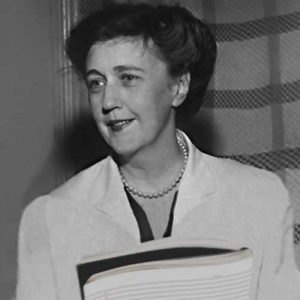A University in Motion. Apply now!

Durr Lecture Series
For nearly 30 years, Auburn University at Montgomery has introduced the River Region community to globally recognized thought leaders and guided conversation about social justice and civil liberties through the Clifford Judkins and Virginia Foster Durr Lecture Series.
Founded in 1992, the Durr Lecture Series has introduced the AUM community to a variety of prominent intellectuals, authors, historians, activists, civic leaders and change agents, including such luminaries as Cornel West, Art Buchwald, Lady Bird Johnson, Fred Gray, Studs Terkel, Rev. Fred Shuttlesworth and Congressman John Lewis. Guest lecturers discuss aspects of the constitutional protection of civil liberties and other timely, relevant issues. The lectures are free and open to the public.
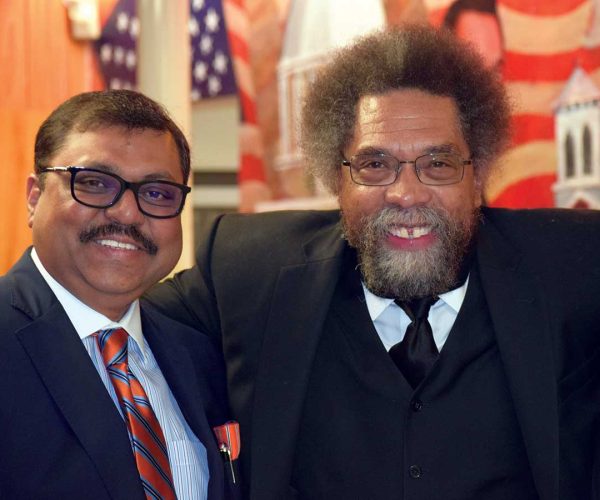

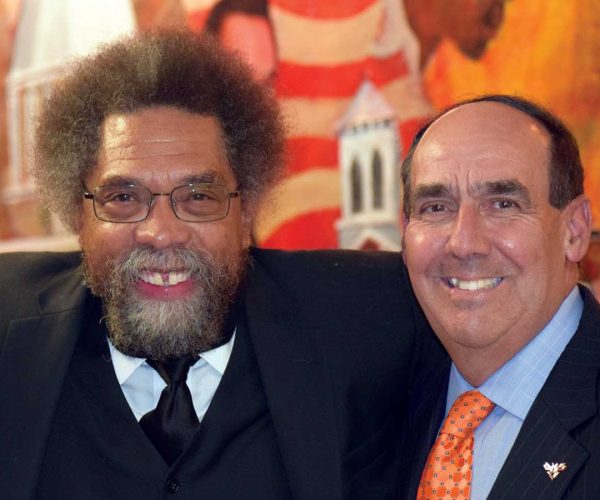
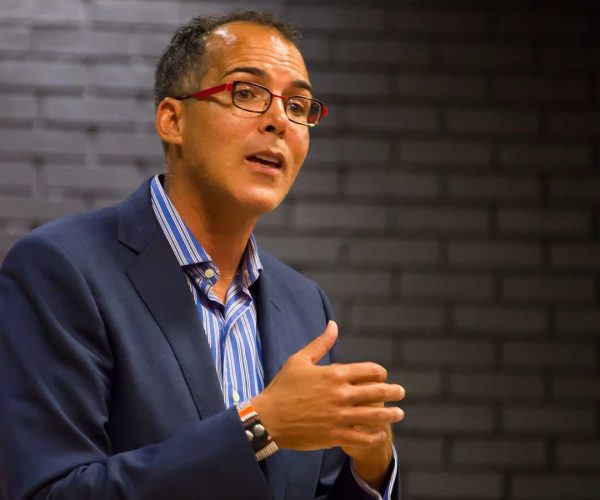
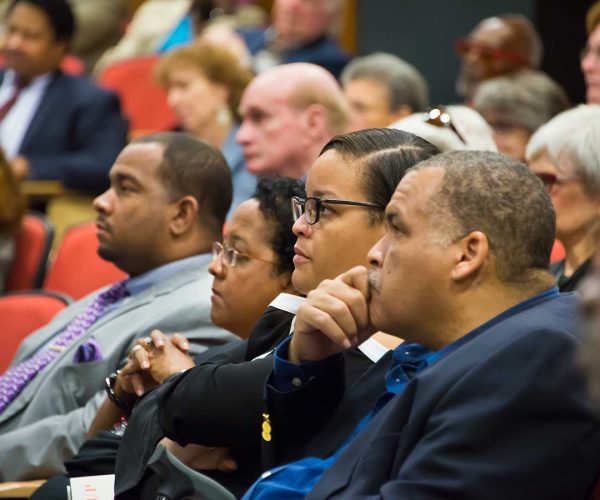
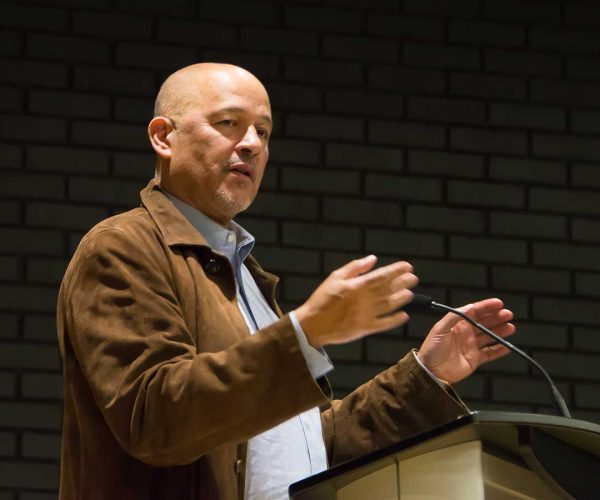
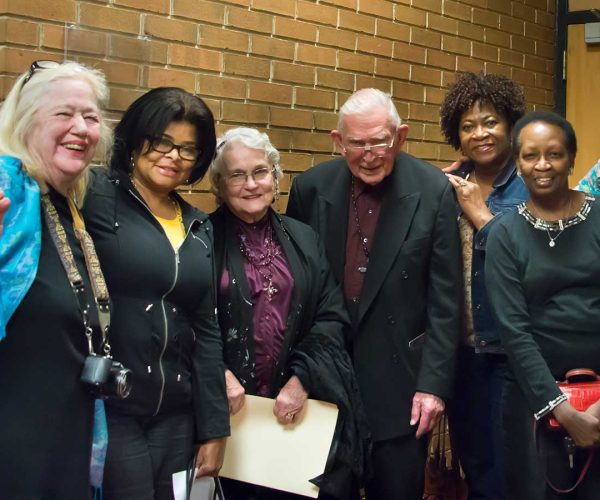
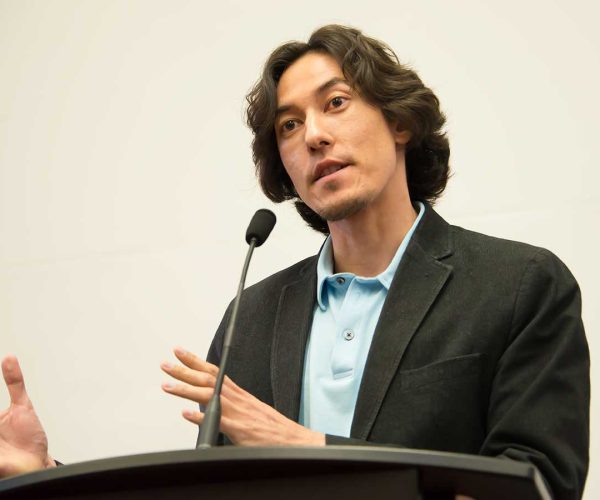
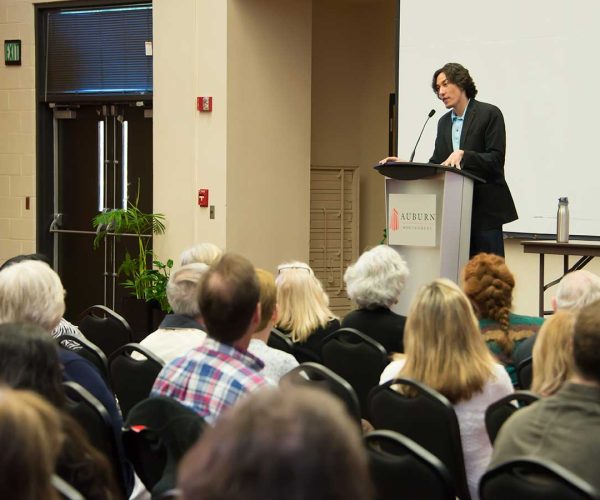
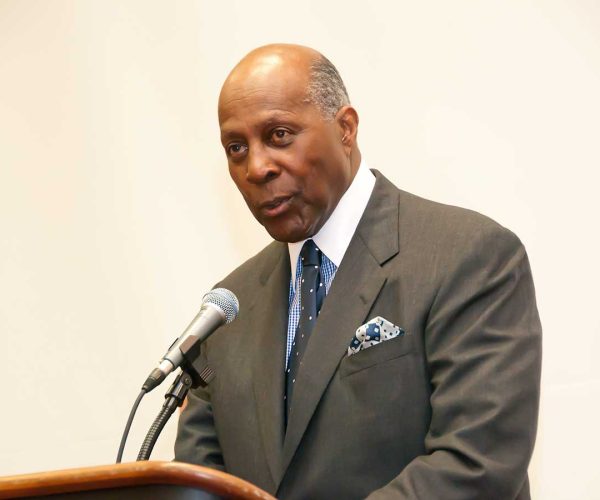
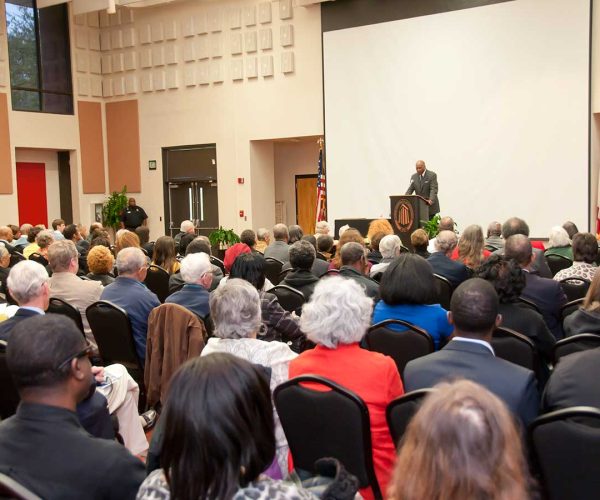
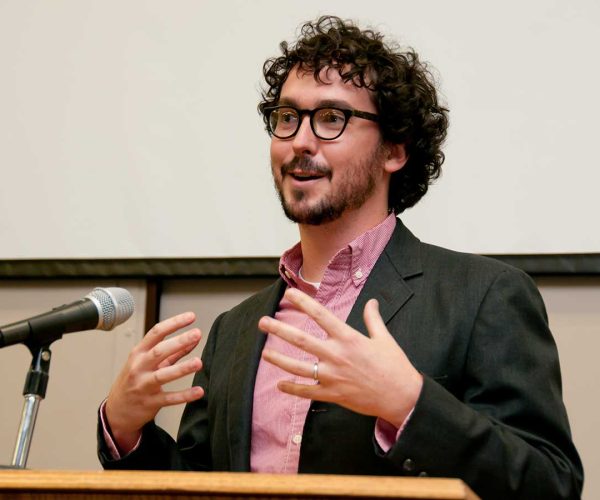
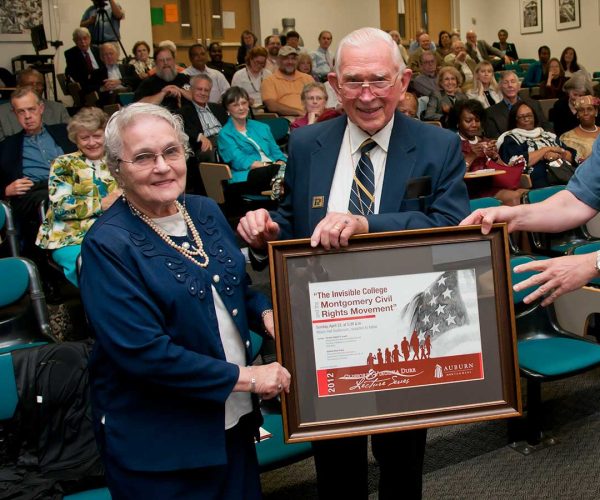
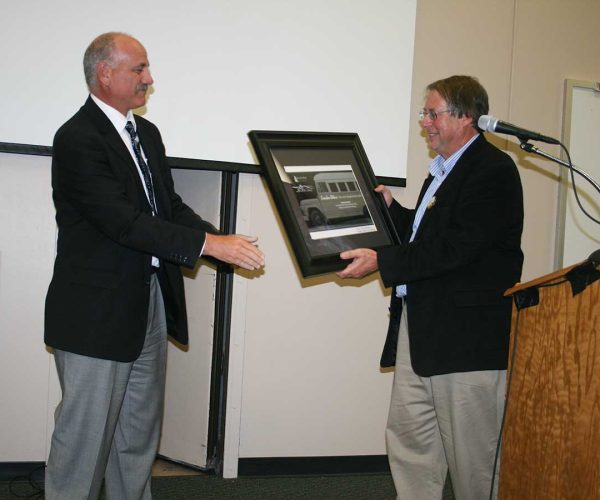
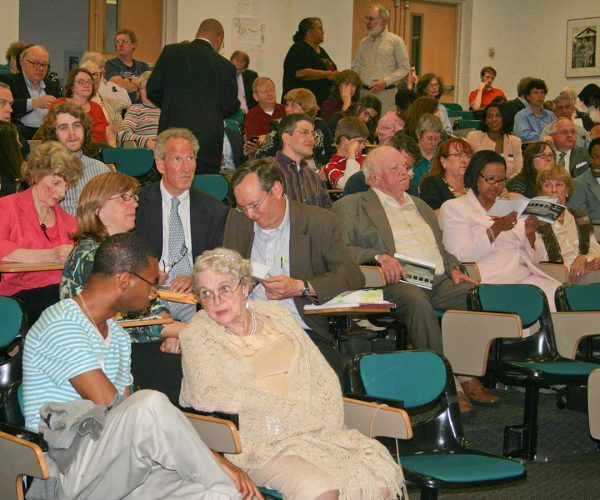
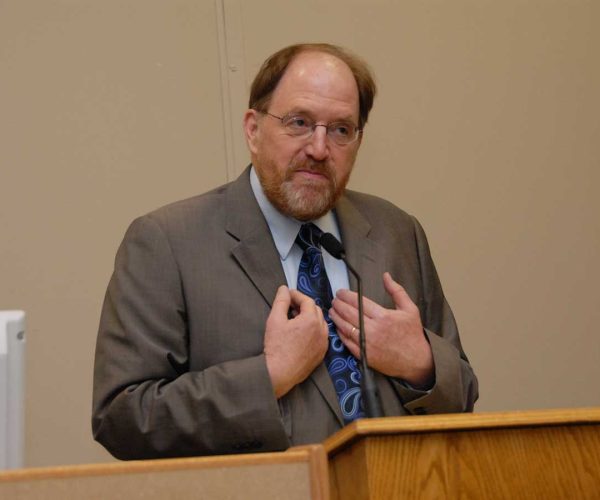
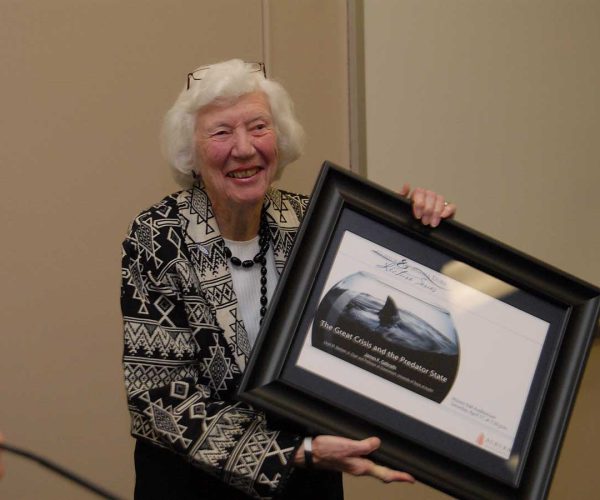
Clifford and Virginia Durr
That fateful day when Rosa Parks was arrested was not where it all began. Ms. Parks long had stirrings that the system was unfair, as indeed it was. Her friendship with Virginia Durr prompted Virginia to obtain for her friend a scholarship to the Highland Folk School in Tennessee. There Rosa Parks experienced true equality and confirmation of her own self-worth.
When the moment came, she was prepared to resist quietly yet another insult to her as a person on this earth. The night of her arrest, Clifford and Virginia went with E. D. Nixon, president of the Montgomery NAACP, to bail Ms. Parks out of the Montgomery jail. Mr. Nixon was afraid that the police would refuse him as a colored person. The next day the news of Ms. Parks’ refusal and arrest spread, and shortly the Bus Boycott began under the leadership of the Rev. Dr. Martin Luther King, Jr.
On the legal front, Fred Gray, a newly admitted attorney, was called to a conference with Ms. Parks and Clifford Durr. It was decided to file an action in the United States District Court challenging racial segregation on city buses, using the principles of constitutional law enunciated in Brown v. Board of Education that separate is not equal under the 14th Amendment in public education, or, as claimed in this new lawsuit, in public transportation. Clifford Durr drafted a petition to the Court, which Fred Gray filed. Virginia’s brother-in-law, Hugo Black, was a sitting member of the United States Supreme Court. They did not want him to recuse himself because Clifford’s name was on the petition, so Fred Gray filed and argued the case. The Eleventh Circuit Court of Appeals ruled that segregation in public accommodations was unconstitutional. The Supreme Court approved the 11th Circuit decision without an opinion. The Bus Boycott was won. In all areas of public accommodations, black and white were legally equal. Then came the Civil Rights Act of 1964 and the Voting Rights Act of 1965.
Virginia used to tell this story many times. She and Clifford became friends of Lyndon and Lady Bird Johnson when Lyndon was a freshman Congressman. When Lyndon became president, Virginia pestered him for years to enact a voting rights bill. Virginia and Eleanor Roosevelt long had fought for an end to the poll tax, tests, and other impediments to voting. “When I have the votes, Virginia,” Johnson always replied. He got the votes in 1965.
Upcoming Events
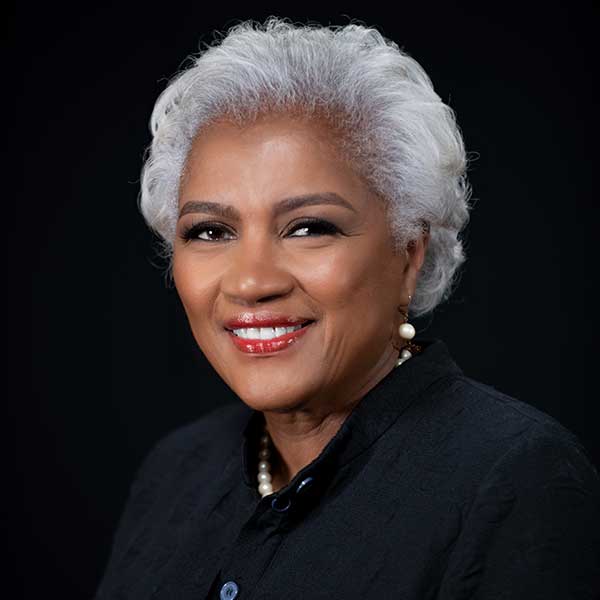
September 2023 Guest Speaker
Donna Brazile
Can We Move Forward Together? Civil Liberties and Civic Virtues in Today’s Society
Donna Brazile is a veteran political strategist, Senior Advisor at Purple Strategies, New York Times bestselling author, Chair of the J. William Fulbright Foreign Scholarship Board, and sought-after Emmy- and Peabody-award-winning media contributor to such outlets as ABC News, USA Today and TheGrio.
She became the first African American woman to serve as the manager of a major party presidential campaign, running the campaign of former Vice President Al Gore. She previously served as interim Chair of the Democratic National Committee and of the DNC’s Voting Rights Institute. She is a current member of the DNC Rules and Bylaws Committee.
She is author of the 2004 best-selling memoir Cooking with Grease: Stirring the Pots in American Politics and the 2017 New York Times Bestseller Hacks: The Inside Story of the Break-Ins and Breakdowns That Put Donald Trump In The White House. She is a co-author of For Colored Girls Who Have Considered Politics, which won the 2019 NAACP Image Award for Outstanding Literary Work, Nonfiction. Ms. Brazile is a contributor to the recently published 400 Souls: A Community History of African America, 1619-2019.
She serves as an adjunct professor in the Women and Gender Studies Department at Georgetown University and served as the King Endowed Chair in Public Policy at Howard University and as a fellow at the Institute of Politics at Harvard Kennedy School. She has lectured at nearly 250 colleges and universities on diversity, equity and inclusion; women in leadership; and restoring civility in American politics.
She is the proud recipient of more than ten honorary doctorate degrees from major colleges and universities, including her alma mater Louisiana State University. In October 2017, Ms. Brazile was the recipient of the W.E.B Du Bois Medal, Harvard’s highest honor in African American studies. Ms. Brazile was the recipient of a Daytime Emmy Award for Outstanding Daytime Program, Good Morning America (2016-2017) in connection with her work with ABC and she was a member of the Peabody Award-winning “Best Political Team on Television” on CNN during the 2008 election cycle.
She moonlights as an actress and is especially honored to have made three cameo appearances on CBS’s The Good Wife, and two cameo appearances on Netflix’s series House of Cards. She also appeared as herself on BET’s Being Mary Jane. Most recently she played herself in the Zack Snyder film Army of the Dead. Ask her and she’ll tell you that acting, after all, is the key to success in politics.
Event Info
Planning on attending?
Questions?
Previous Durr Lectures and Speakers
Want More Info About AUM?
334-244-3000
334-244-3795
[email protected]
8 a.m. – 5 p.m. Monday – Friday
Send AUM Admissions a Message
"*" indicates required fields
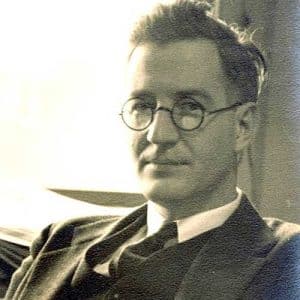
Clifford Judkins Durr (1899-1975)
Clifford Durr was born and raised in Montgomery and Virginia Foster Durr in Birmingham. Clifford attended local schools and the University of Alabama and was a Rhodes Scholar at Oxford University, where he received a law degree. Virginia attended Birmingham Schools and Wellesley College. They began married life in 1926 with the expectations that Virginia would be a housewife and social figure, and Clifford would be a successful corporate lawyer.
Clifford began a career in law in Birmingham with the predecessor of the Balch and Bingham law firm. Virginia busied herself with the usual “genteel lady” activities of the day, however she was appalled at the condition of many workers and their families, which she saw while doing church social work and soon became an activist for the cause of the underprivileged.
Clifford and Virginia moved to Virginia in 1933 when he was appointed legal counsel to the Reconstruction Finance Corporation and later Chief Legal Counsel to the Defense Plant Corporation. Their home on Seminary Hill became a center of lively political discussion with distinguished guests. Four daughters, Ann, Lucy, Lulah and Tilla and a son who died at an early age were born to Clifford and Virginia. In 1941 Clifford was appointed to the Federal Communications Commission, where he headed the effort to save channels for public radio and television, and Virginia became active in the fight to eradicate the poll tax. She was a founding member of the Southern Conference for Human Welfare. Clifford challenged and embarrassed J. Edgar Hoover when he refused to fire an FCC employee with suspected communist connections (some of the alleged connections were war committees headed by Supreme Court Justices and the Vice President), and he was not reappointed to the FCC.
They returned to Montgomery in 1955, where Clifford began a law practice with Virginia as his secretary. E.D. Nixon called on Clifford and Virginia the night Rosa Parks was arrested because he feared the police would not let a black man bail her out. Virginia and Rosa were friends, and she and Clifford went with Nixon to post bond for Ms. Parks. Thus began their trials as Clifford agreed to help file suit to declare the segregated bus system unconstitutional. Even though the community would soon condemn, and in some cases, threaten them, Clifford and Virginia continued to help the bus boycott. Their home became a haven for visiting activists and newspaper reporters. Through continued hard times Clifford never relinquished his belief in the democratic system under the constitution, and Virginia never gave a moment’s peace to those who would continue a system of segregation. Her shining moment finally came when President Lyndon Johnson signed the voting rights bill into law abolishing the poll tax. Clifford and Virginia left a legacy of courage and conviction that is worthy of all men and women to follow.
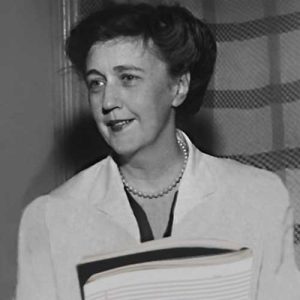
Virginia Foster Durr (1903 -1999)
Virginia Foster was the daughter of an Alabama Presbyterian minister. She was born on August 6, 1903, in Birmingham, AL. As a child she shocked her elders by rebelling against the treatment of her black friends. However, she accepted segregation and was forced to question her beliefs for the first time at Wellesly College. As a sophomore she was faced with a “rotating tables” policy that she didn’t want to participate in. This policy required students to eat meals at tables with a random group of fellow students, including African Americans. After protesting this policy, Virginia was told she would either have to abide by the policy or leave school. She decided to stay.
She was forced to leave the college her junior year because of financial difficulties. After returning to Birmingham, AL, she met her future husband, attorney Clifford Durr. After their marriage, they moved to Washington, D.C. Durr was gradually converted to more liberal beliefs through her associations with her husband’s New Deal colleagues. While her husband worked for President Roosevelt, Virginia joined the Woman’s National Democratic Club. This contact with political activists ignited her own activist tendencies. She found the poll tax, which was particularly used on African Americans and women, very offensive. She worked very closely with liberal political leaders to gain the necessary support for legislation, which resulted in the passage of the Voting Rights Act of 1965 and the dismissal of the poll tax. The Durr’s became involved in the anti-Communist hysteria surrounding the congressional hearings supported by Senator Joseph McCarthy and Senator James O. Eastland. Virginia was subpoenaed as a witness on supposed Communist influences in Eleanor Roosevelt’s circle. Because of the stress, Clifford suffered a nervous collapse.
Virginia became a founding member of the Southern Conference on Human Welfare. Because of Virginia and Clifford’s controversial positions on issues of race, many white people in Birmingham didn’t like them. That didn’t stop them. They continually tried to stop institutionalized racism. The Durr’s provided legal advice to blacks and also supported the Freedom Riders and the Voting Rights Act. In December 1955, Virginia and Clifford Durr bailed Rosa Parks out of jail after she was arrested in Montgomery for refusing to give up her seat to a white man on one of the segregated buses. Shortly after, Virginia helped to organize the Montgomery bus boycott. She also wrote many essays on the civil rights struggle. Her first was on the trial of a Ku Klux Klan member in Alabama. In her later years, Virginia supported nuclear disarmament. Durr had a very active life. Her career work included: Civil rights activist, relief worker during the Great Depression, lobbyist, campaign worker for Progressive Party candidate Henry Wallace, and participant in Eyes on the Prize, a PBS television series on the civil rights movement. After having an influential career and raising four daughters, Virginia Durr died on February 24, 1999, at the age of 95. An obituary in the London Times noted that “to the end of her long life [Durr remained] the soul of indiscretion, inveighing against those she regarded as sinners while canonizing those she considered soul mates.”
2023 Durr Essay Contest Rules and Guidelines
Eligibility:
The essay contest is open to full-time AUM undergraduate students.
Submission Guidelines:
Submissions must be original and written solely by the participant.
Essays should be typed in Times New Roman, 12-point font, and double-spaced.
Essay length should be between 1000 and 1,500 words.
Submissions must be sent via email to [email protected] address by 11:59 PM September 15, 2023.
Late submissions will not be considered.
Submissions must Include the participant’s name and contact information.
The subject line of the email should read: “Durr Essay Submission.”
Topic:
Discuss an instance in which you, someone you know, or someone historical or in the news took a moral or ethical stand to do the right thing, even though it was not popular. One example occurred in 1955 when Clifford and Virginia Durr bailed Ms. Rosa Parks out of jail after she was arrested for not moving to the back of the bus, despite the possibility that this action could hurt Mr. Durr’s law practice and make them both outcasts in Montgomery. For the person you select, describe why the stand they took was unpopular and also explain why it was the morally right thing to do.
Participants should ensure their essays are relevant to the provided theme.
Judging Criteria:
The Durr Essays Committee will evaluate essays based on originality, creativity, adherence to the theme, clarity of expression, and overall quality of writing.
Judges’ decisions are final and binding.
Awards:
The winner will be awarded a $1000 scholarship. The winner will also be invited to a dinner held for the 2023 speaker on the evening of the lecture.
The second and third places entries will each receive a scholarship of $500.
Rights and Permissions:
By submitting an essay, participants grant the contest organizers the right to publish or feature the essay, in whole or in part, for promotional purposes.
All intellectual property rights of the essays remain with the participants.
Plagiarism:
Plagiarism of any kind will result in immediate disqualification.
All sources must be appropriately cited.
Notification:
Winners will be notified via email.
Results may also be posted on the contest website or social media platforms.
Contest Rules:
The Durr Essay Committee reserves the right to disqualify any entry that does not meet the specified guidelines.
The Durr Essay Committee reserves the right to make changes to the rules, guidelines, prizes, and other aspects of the contest without prior notice.
By participating in this essay contest, participants agree to abide by the rules and guidelines outlined above.
For inquiries, please contact [email protected]
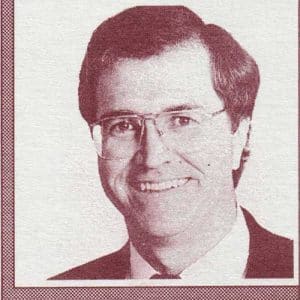
1992 Durr Lecturer | W. Thomas Johnson
Tom Johnson, President, Cable News Network (CNN), has achieved distinction in a 27-year career in print and broadcast media in addition to his earlier service int he White House. After selection as a prestigious White House Fellow, he became Executive Assistan to former President Lyndon B. Johnson. He then held president and publisher positions wit the Dallas Times Herald, Los Angeles Times, and Times Mirror Company before his appointment to CNN.
Mr. Johnson’s honor include Cable Executive of the Year, Horatio Alger Distinguished American Award, U.S. Publisher of the Year, and President oft he White House Fellow Association. He is a graduate of the University of Georgia School of Journalism and Harvard University Graduate School of Business.
Mr. Johnson’s professional appointments include Chairman, Board of Directors, Lyndon B. Johnson Foundation; Chairman, John S. Knight Professional Journalism Fellowships Board, Stanford University; and member, Board of Trustees, The Rockefeller Foundation, The University of Georgia Foundation, and Wesleyan College.

2007 Durr Lecturer | Jonathan Steele
Johnathan Steele is Senior Foreign Correspondent and in-house columnist on international affairs for The Guardian, London.
He graduated from Cambridge university in the classics In 1963 before spending two years at Yale where he obtained an MA in economics.
Who at Yale, he worked as a volunteer on the Mississippi Summer Project in 1964 helping black Americans register to vote. He took part int he march from Selma to Montgomery that turned back at the Edmund Pettus bridge on March 9. 1965.
He joined The Guardian later that year as a reporter. His first foreign assignment was as East European correspondent soon after the Soviet invasion of Czechoslovakia in 1968. The became the paper’s Washington C.C. bureau chief in 1975, and covered Jimmy Carter’s election and presidency.
As Chief Foreign Correspondent in the 1080s he travelled widely, covering wars in southern Africa and central America. A regular visitor to Afghanistan, he was the only Western newspaper correspondent in Kabul when Soviet forces withdrew. He also covered the Taliban take over it 1996 and their collapse in 2001. He also covered the U/s/s Invasion of Grenada in 1983.
As bureau chief in Moscow from 1988 to. 1994, he reported on the end of Soviet communism and the dissolution of the USSR. He was the only English-language reporter to reach Mikhail Gorbachev’s prison villa during the August 1991 coup where he interviewed the Soviet president, a feat which won him the London Press Club’s Scoop of the Year award.
In his present role he regularly travels to the Middle East. He has had eight assignments in Iraq since the U.S. invasion in March 2003, and was there mot recently in November 2006.
He has twice won the International Reporter of the Year title in the British Press awards the UK equivalent of the Pulitzer Prize. He has also one the same title in the Amnesty International annual awards.
A frequent broadcaster on the BBC and CNN Steele is known. For his radical insight into foreign affairs. He has written books on issues affecting South Africa, Germany and the Soviet Union/Russia. His 1983 work, The Limits of Soviet Power, challenged the Reagan administration’s assumptions that Moscow’s global might was on the increase. His most recent book, Eternal Russia: Yeltsin, Gorbachev, and the Mirage of Democracy argued that long-standing Russian traditions would undermine Western exceptions of a rapid transition to democratic practice after the fall of Communism. He is currently writing a book on Iraq.
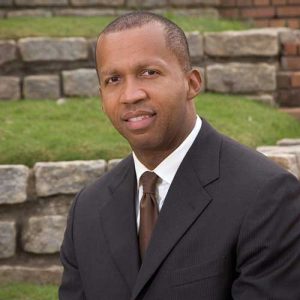
2008 Durr Lecturer | Bryan Stevenson
Bryan Stevenson is executive director of the Equal Justice Initiative of Alabama in Montgomery, Alabama, and a professor of law at New York University School of Law. He is widely acclaimed as one of the most effective public service lawyers in America. A graduate of both the Harvard Law School, where he was awarded the Harvard Fellowship in Public Interest Law, and the Harvard School of Government, where he was awarded the Kennedy Fellowship in Criminal Justice, Mr. Stevenson has devoted his life to helping disadvantaged people in the Deep South. He and his staff have been largely responsible for reversals or reduced sentences in over 65 death penalty cases.
In 1985, Mr. Stevenson joined the Southern Center for Human Rights in Atlanta as a staff attorney. From 1989-1995, he represented capital defendants as executive director of the Alabama Capital Representation Resource Center. As executive director of EJI, Mr. Stevenson represents indigent defendants, death row prisoners and juveniles who have been denied fair and just treatment in the legal system. He is committed to informing policy makers in the critically important work of reforming the administration of criminal justice, and he assists counsel representing death row inmates by providing training materials and consultation.
Mr. Stevenson’s work on behalf of condemned prisoners has attracted national acclaim from the Washington Post, the New York Times, People Magazine, Life Magazine and several national television programs, including Nightline and 60 Minutes, which featured a case
in-which he and his staff won the release of a death row prisoner who had spent six years on death row for a crime he did not commit.
In 1995, Mr. Stevenson was awarded the prestigious MacArthur Fellowship Award for his work. In 1989, he received the Reebok Human Rights Award along with the Chinese student leaders at the Tiananmen Square massacre. In 1991, he received the National Medal of Liberty from the American Civil Liberties Union after he was nominated by United States Supreme Court Justice John Stevens. Mr. Stevenson was named the 1996 Public Interest Lawyer of the Year by the National Association of Public Interest Lawyers. He is also a recipient of the Gleitsman Foundation’s National Citizen Activist Award and in 2000, he received the Olaf Palme Prize in Stockholm, Sweden, for international human rights.
The American Bar Association has honored Mr. Stevenson with its John Minor Public Service and Professionalism Award.
He also has received the Alabama State Bar Commissioners Award, the SALT Human Rights Award from The Society of American Law Teachers, the American College of Trual Lawyers’ Award for Courageous Advocacy and the National Lawyers Guild’s Lawyer for the People Award.
Mr. Stevenson has received honorary degrees from Yale University, the University of Pennsylvania, Georgetown University, Washington University, Eastern University, City University of New York School of Law, Metropolitan College of New York, The Bank Street College of Education, Bard College and Villanova University.
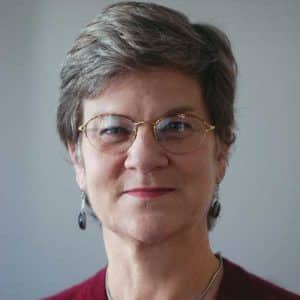
2009 Durr Lecturer | Dr. Kathleen Hall Jamieson
Dr. Kathleen Hall Jamieson is the Elizabeth Ware Packard Professor of Communication at the Annenberg School for Communication and Walter and Leonore Annenberg director of the Annenberg Public Policy Center at the University of Pennsylvania. Jamieson is a fellow of the American Academy of Arts and Sciences and a member of the American Philosophical Society. She is the author, co‑author or editor of 15 books, including: Presidents Creating the Presidency (University of Chicago Press, 2008), Echo Chamber: Rush Limbaugh and the Conservative Media Establishment (Oxford, 2008) and unSpun: Finding Facts in a World of Disinformation (Random House, 2007). During the 2004 general election, Jamieson regularly appeared on NOW with Bill Moyers and The Newshour and throughout the 2008 campaign appeared regularly on Bill Moyers Journal. Jamieson has won university-wide teaching awards at each of the three universities at which she has taught.

2010 Durr Lecturer | James K. Galbraith
Noted economist Dr. James K. Galbraith brings to AUM’s Durr Lecture Series his insights about the political and corporate forces that shape the American economy. His presentation will draw heavily from his research on the measurement and understanding of inequality in the world economy — research that also is the basis for his latest book: The Predator State: How Conservatives Abandoned the Free Market and Why Liberals Should Too (2008).
Galbraith holds the Lloyd M. Bensten Jr. Chair in the Lyndon B. Johnson School of Public Affairs at the University of Texas at Austin and directs the University of Texas Inequality Project, an informal group researching economic inequalities. In addition, he is a senior scholar of the Levy Economics Institute and chairman of the Board of Economists for Peace and Security, a global professional network.
He holds degrees from Harvard and Yale and studied as a Marshall Scholar at King’s College, Cambridge in the 1970s. He later served in several positions on the staff of Congress, including executive director of the Joint Economic Committee. He was a guest scholar at the Brookings Institution in 1985 and directed UT’s Ph.D. Program in Public Policy from 1995 to 1997.
A prolific writer, his books include Balancing Acts: Technology, Finance and the American Future and Created Unequal: The Crisis in American Pay. His book Inequality and Industrial Change: A Global View is co-edited with Maureen Berner. He also co-authored two textbooks, The Economic Problem with the late Robert L. Heilbroner and Macroeconomics with William Darity Jr. In addition, Galbraith writes a column for Mother Jones and provides occasional commentary in many other publications, including The Texas Observer, The American Prospect and The Nation.
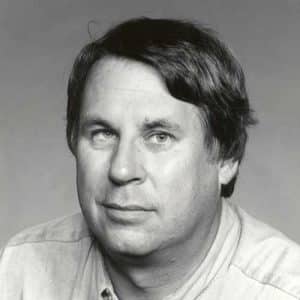
2011 Durr Lecturer | Dr. Raymond Arsenault
Raymond Arsenault is the John Hope Franklin Professor of Southern History and Program Advisor of the Florida Studies Program at the University of South Florida St. Petersburg, where he has taught since 1980.
A specialist in the political, social, and environmental history of the American South, he has also taught at the University of Minnesota, Brandeis University, and at the Universite d’Angers, in France, where he was a Fulbright Lecturer in 1984-85.
From 1980 to 1987, he was the codirector of the Fulbright Commission’s Summer Institute on American Studies at the University of Minnesota. He has also served as a consultant for numerous museums and public institutions — including the National Park Service, the National Civil Rights Museum, the Rosa Parks Museum, and the United States Information Agency — and he has lectured on American history and culture in a number of countries, including France, Great Britain, Belgium, Germany, Greece, Norway, Turkey, and Jordan.
Arsenault was educated at Princeton University (B.A. 1969) and Brandeis University, where he received his Ph.D. in 1981. He is the author of two prizewinning books — The Wild Ass of the Ozarks: Jeff Davis and the Social Bases of Southern Politics (1988) and St. Petersburg and the Florida Dream, 1888-1950 (1998) — and of The End of the Long Hot Summer: The Air Conditioner and Southern Culture, Journal of Southern History (1984), which won the Southern Historical Association’s Green-Ramsdell Prize. An edited volume, Crucible of Liberty: 200 Years of the Bill of Rights, was published during the 1991 Bicentennial of the Bill of Rights. His recent publications include Freedom Riders: 1961 and the Struggle for Racial Justice (2006), Paradise Lost? (2005), an anthology (co-edited with Jack Davis) on the environmental history of Florida, The Changing South of Gene Patterson:
Journalism and Civil Rights, 1960-1968 (2002), co-edited with Roy Peter Clark, and The Public Storm: Hurricanes and the State in Twentieth-Century America, in American Public Life and the Historical Imagination (2003). He is currently working on Landmarks of American Sports, co-edited with Randall Miller.
Since 1996 Arsenault and USF history colleague Gary Mormino have served as the co-editors of the University Press of Florida’s highly acclaimed “Florida History and Culture” book series.
An active member of the Florida affiliate of the American Civil Liberties Union since the early 1980s, he served two terms as state president (1998-2000) and received the Nelson Poynter Civil Liberties Award in 2003.
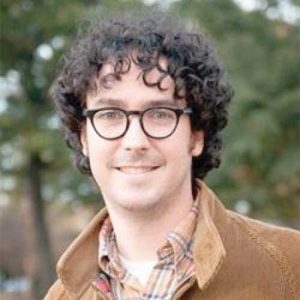
2012 Durr Lecturer | Andrew Beck Grace
Andrew Beck Grace is an independent documentary filmmaker whose films have aired on public television stations and at film festivals across the country. Grace teaches in the Department of Telecommunication and Film at the University of Alabama. His talk focuses on a new film, “The Durrs of Montgomery.”
Grace received an M.A. in American Studies from the University of Wyoming, where he made his first documentary feature about the re-enactments of Custer’s Last Stand in southern Montana. Grace spent several years out West making films, freelancing for magazines and working as a producer for NPR News before moving back to his home state. He is currently at work on a documentary, funded by the Independent Television Service, called “Eating Alabama.”
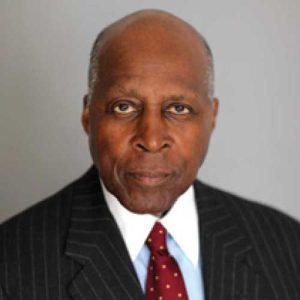
2013 Durr Lecturer | Vernon Jordan
Vernon Jordan has long been active in the civil rights movement, beginning as a lawyer often working on behalf of the cause in the 1960s.
After growing up in a segregated Atlanta in the 1950s, Jordan attended DePauw University and then went on to complete law school at Howard University. Jordan served as a political adviser to President Bill Clinton and also assisted with John Kerry’s 2004 campaign. He is the author of a memoir, “Vernon Can Read!” with Annette Gordon-Reed. In 2001, he was awarded the Springarn Medal from the NAACP for lifetime achievement.
As a current or former member of the Board of Directors of several prominent corporations, such as Dow Jones and Company, American Express and J.C. Penney, he has a long history of business leadership. Currently, he serves as the senior managing director for investment firm Lazard Ltd. in New York.

2014 Durr Lecturer | Dr. Steve Hahn
Steve Hahn is Roy F. and Jeannette P. Nichols Professor of History at the University of Pennsylvania. Dr. Hahn is a specialist on history of 19th century America, African-American history, the history of the American South, and the international history of slavery and emancipation. He is the author of The Roots of Southern Populism: Yeoman Farmers and the Transformation of the Georgia Upcountry, 1850-1890, which received both the Allan Nevins Prize of the Society of American Historians and the Frederick Jackson Turner Award of the Organization of American Historians. He is also the coeditor (with Jonathan Prude) of The Countryside in the Age of Capitalist Transformation: Essays in the Social History of Rural America and (with Steven Miller, Susan O’Donovan, John Rodrigue, and Leslie Rowland) of Freedom: A Documentary History of Emancipation, 1861-1867. Series III: Land and Labor in 1865. In 2004, Dr. Hahn’s book A Nation Under our Feet: Black Political Struggles in the Rural South from Slavery to the Great Migration received the Pulitzer Prize in History, the Bancroft Prize in American History, and the Merle Curti Prize in Social History of the Organization of American Historians.
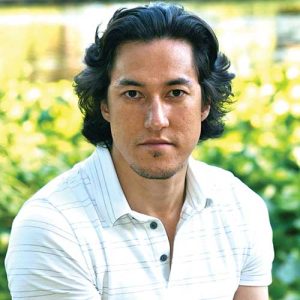
2015 Durr Lecturer | Paul K. Chappell
Paul K. Chappell is the Peace Leadership Director of the Nuclear Age Peace Foundation. After graduating from West Point in 2002, he served in Iraq before leaving the army in 2009 as a captain.
Since his war experience, Chappell has become an internationally recognized speaker on waging peace. He is the author of five books: Will War Ever End? A Soldier’s Vision of Peace for the 21st Century (2009), The End of War: How Waging Peace Can Save Humanity, Our Planet, and Our Future (2010), Peaceful Revolution: How We Can Create the Future Needed for Humanity’s Survival (2012), The Art of Waging Peace: A Strategic Approach to Improving Our Lives and the World (2013), The Cosmic Ocean: New Answers to Big Questions (forthcoming, 2015). These works are the first in a projected seven-book series on ending war and waging peace.
He teaches a graduate course on Peace Leadership at the University of San Diego School of Leadership and Education Sciences. Additionally, he teaches the two- and three-day workshop Peace Leadership Course: How to Wage Peace and Promote Justice.
Born in Alabama to a half-black, half-white father who fought in Korea and Vietnam, and to a Korean mother, Chappell draws on his own experience with violence and war to project a vision for ending war and living a life of purpose and hope.
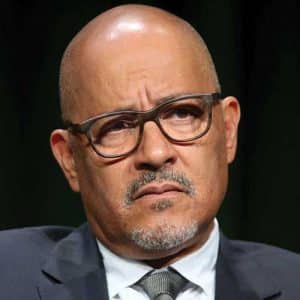
2016 Durr Lecturer | Clark Johnson
Clark Johnson is a highly regarded actor and director. His work on television includes “Homicide: Life on the Street,” “The Wire,” and “Homeland.” His feature films include S.W.A.T., The Sentinel, and Boycott. Boycott, starring Jeffrey Wright, Carmen Ejogo and Terence Howard, is considered one of the definitive films about the historic struggle for civil rights in the U.S. It depicts how the Montgomery Bus Boycott was the result of both years of preparation and creative innovation — and illustrates how a novice preacher named Martin Luther King Jr. emerged from that struggle as the public face and voice of the movement.
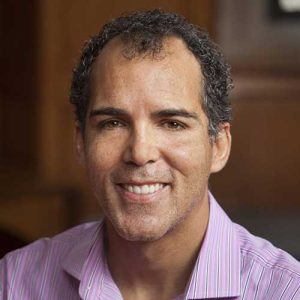
2017 Durr Lecturer | James Forman Jr.
James Forman Jr. is a Clinical Professor of Law at Yale Law School. He is a graduate of Atlanta’s Roosevelt High School, Brown University and Yale Law School, and he served as a law clerk for Judge William Norris of the U.S. Court of Appeals for the Ninth Circuit and Justice Sandra Day O’Connor of the United States Supreme Court.
Professor Forman taught at Georgetown Law from 200 to 2011, when he joined the Yale faculty. At Yale, he teaches Constitutional Law, a seminar on Race and Criminal Justice System, and a clinic called the Educational Opportunity and juvenile Justice Clinic. In the clinic, Professor Forman and his students represent young people facing expulsion from school for disciple violations, and they work to keep their clients in school and on track towards graduation.
Professor Forman teaches and writes in the areas of criminal procedures and criminal law policy, constitutional law, juvenile justice, and education law and policy. His particular interests are schools, prisons, police, and those institutions’ race and class dimensions. Professor Forman’s book, titled Lacking Up Our Own: Crime and Punishment in Black America, will be published in the spring 2017 by Farrar Straus and Giroux.
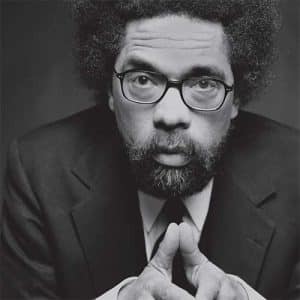
2018 Durr Lecturer | Dr. Cornel West
Cornel West is a prominent and provocative democratic intellectual. He is Professor of the Practice of Public Philosophy at Harvard University and holds the title of Professor Emeritus at Princeton University. He has also taught at Union Theological Seminary, Yale, Harvard, and the University of Paris. Cornel West graduated Magna Cum Laude from Harvard in three years and obtained his M.A. and Ph.D. in Philosophy at Princeton. He has written 20 books and has edited 13. Though he is best known for his classic Race Matters — which celebrates its 25th Anniversary with a new release— he has also written Democracy Matters and his memoir, Brother West: Living and Loving Out Loud, as well as the critically acclaimed Black Prophetic Fire. Dr. West is a frequent guest on Real Time with Bill Maher, Colbert Report, CNN, C-Span and Democracy Now.
He made his film debut in The Matrix — and was the commentator (with Ken Wilbur) on the official trilogy released in 2004. He also has appeared in over 25 documentaries and films including Examined Life, Call & Response, Sidewalk and Stand.
Last, he has made three spoken word albums including Never Forget, collaborating with Prince, Jill Scott, Andre 3000, Talib Kweli, KRS-One and the late Gerald Levert. His spoken word interludes were featured on Terence Blanchard’s Choices (which won the Grand Prix in France for the best Jazz Album of the year of 2009), The Cornel West Theory’s Second Rome, Raheem DeVaughn’s Grammy-nominated Love & War: Masterpeace, and most recently on Bootsy Collins’ The Funk Capital of the World. In short, Cornel West has a passion to communicate to a vast variety of publics in order to keep alive the legacy of Martin Luther King, Jr. — a legacy of telling the truth and bearing witness to love and justice.
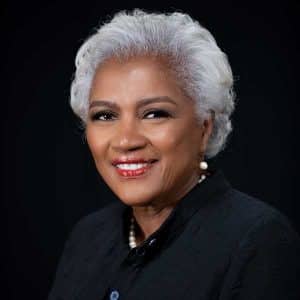
2023 Durr Lecturer | Donna Brazile
Donna Brazile is a veteran political strategist, Senior Advisor at Purple Strategies, New York Times bestselling author, Chair of the J. William Fulbright Foreign Scholarship Board, and sought-after Emmy- and Peabody-award-winning media contributor to such outlets as ABC News, USA Today and TheGrio.
She became the first African American woman to serve as the manager of a major party presidential campaign, running the campaign of former Vice President Al Gore. She previously served as interim Chair of the Democratic National Committee and of the DNC’s Voting Rights Institute. She is a current member of the DNC Rules and Bylaws Committee.
She is author of the 2004 best-selling memoir Cooking with Grease: Stirring the Pots in American Politics and the 2017 New York Times Bestseller Hacks: The Inside Story of the Break-Ins and Breakdowns That Put Donald Trump In The White House. She is a co-author of For Colored Girls Who Have Considered Politics, which won the 2019 NAACP Image Award for Outstanding Literary Work, Nonfiction. Ms. Brazile is a contributor to the recently published 400 Souls: A Community History of African America, 1619-2019.
She serves as an adjunct professor in the Women and Gender Studies Department at Georgetown University and served as the King Endowed Chair in Public Policy at Howard University and as a fellow at the Institute of Politics at Harvard Kennedy School. She has lectured at nearly 250 colleges and universities on diversity, equity and inclusion; women in leadership; and restoring civility in American politics.
She is the proud recipient of more than ten honorary doctorate degrees from major colleges and universities, including her alma mater Louisiana State University. In October 2017, Ms. Brazile was the recipient of the W.E.B Du Bois Medal, Harvard’s highest honor in African American studies. Ms. Brazile was the recipient of a Daytime Emmy Award for Outstanding Daytime Program, Good Morning America (2016-2017) in connection with her work with ABC and she was a member of the Peabody Award-winning “Best Political Team on Television” on CNN during the 2008 election cycle.
She moonlights as an actress and is especially honored to have made three cameo appearances on CBS’s The Good Wife, and two cameo appearances on Netflix’s series House of Cards. She also appeared as herself on BET’s Being Mary Jane. Most recently she played herself in the Zack Snyder film Army of the Dead. Ask her and she’ll tell you that acting, after all, is the key to success in politics.
The Founding Of The Clifford Judkins And Virginia Foster Durr Lectures At Auburn University Montgomery
In 1992 Allen Hess, Chair of the Psychology Department, approached William Honey, Associate Professor in the School of Business, and suggested that AUM needed a lecture series featuring nationally known speakers.
Honey replied that his friend, Virginia Durr, was famous in her own right and had friends who were national figures, and both she and her late husband, Clifford Durr deserved to be honored.
When Honey asked Virginia Durr if AUM could begin an annual lecture series in her name, she was adamant that the lectures be named after Clifford, not her. “No one would give money to a lecture named after me. I am too controversial.” Hess and Honey met with the AUM Chancellor, who wholeheartedly accepted the idea. The inaugural lecture took place on March 1, 1992.
After Virginia Durr’s passing in 1999, lecture series was renamed “The Clifford Judkins and Virginia Foster Durr Lectures.” Honey and Hess continued to run the lecture each year and Ann Durr Lyon and Lucy Durr Hackney offered ongoing support.
Honey’s and Hess’s active involvement ended after 2004 and the management of the series was moved from the AUM Psychology Department and placed in the office of the Provost where it continues to be housed. After the transfer, the lecture was organized by either an Associate Provost or an AUM Faculty member.

